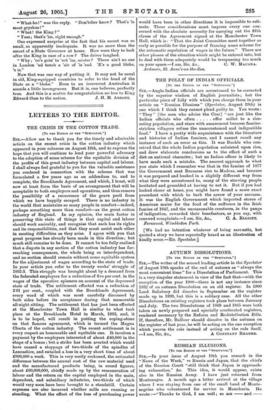[To THU EDITOR OP THE "SPECTATOR."] Sm,—Allow me to thank
you for the timely and admirable article on the recent crisis in the cotton industry which appeared in your columns on August 19th, and to express the hope that you will continue to lend your powerful advocacy to the adoption of some scheme for the equitable division of the profits of this great industry between capital and labour. I shall always feel grateful to you for the valuable assistance you rendered in connection with the scheme that was formulated a few years ago as an addendum to, and to complete, the Brooklands Agreement, and which, I trust, will now at least form the basis of an arrangement that will be acceptable to both employers and operatives, and thus remove the possibility of a recurrence of the grave peril from which we have happily escaped. There is no industry in the world that maintains so many people in comfort—indeed, perhaps something more than comfort—as the great cotton industry of England. In my opinion, the main factor in preserving this state of things is that capital and labour should work amicably, and recognise that each has its rights and its responsibilities, and that they must assist each other in meeting difficulties as they arise. I agree with you that great progress has already been made in this direction; but much still remains to be done. It cannot be too fully realised that a dispute in any section of the cotton industry has far- reaching consequences, the whole being so interdependent, and no section should remain without some equitable system for the adjustment of wages according to the state of trade. In your article you refer to the twenty weeks' struggle of 1892-3. This struggle was brought about by a demand from the federated employers for a reduction of five per cent. in the wages of the operative spinners on account of the depressed state of trade. The settlement effected was a reduction of 2.91 per cent., coupled with the Brooklands Agreement, every word of which was most carefully discussed by both sides before its acceptance during that memorable all-night sitting. The settlement that has just been effected at the Manchester Town Hall is similar to what took place at the Brooklands Hotel in March, 1893, and, it is to be hoped, will result in putting the coping-stone on that famous agreement, which is termed the Magna Charts of the cotton industry. The recent settlement is in every respect an honourable and equitable one. It involves a payment by the employers interested of about £40,000 in the shape of a bonus ; but a strike has been averted which would have caused a stoppage of two-thirds of the spindles of Lancashire, and entailed a loss in a very short time of about 2800,000 a week. This is very easily reckoned, the estimated difference between the annual cost of the raw material used and the manufactured products being, in round figures, about £60,000,000, chiefly made up by the remuneration of labour and the return on the capital employed in the main, dependent, and subsidiary industries, two-thirds of which would very soon have been brought to a standstill. Certain expenses are also incurred whether mills are running or standing. What the effect of the loss of .purchasing power
would have been in other directions it is impossible to esti- mate. These considerations must impress every one con- cerned with the absolute necessity for carrying out the fifth clause of the Agreement signed at the Manchester Town Hall, which is : "That the Joint Committee meet together as early as possible for the purpose of framing some scheme for the automatic regulation of wages in the future." There are other phases of the situation which might be entered into, but to deal with them adequately would be trespassing too much
Oil your space.—I am, Sir, &c., C. W. MACARA. Ardmore, St. Anne's-on-the-Sea.


































 Previous page
Previous page